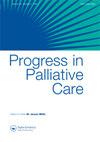Infusing the palliative into paramedicine: Inter-professional collaboration to improve the end of life care response of UK ambulance services
IF 0.8
Q4 PUBLIC, ENVIRONMENTAL & OCCUPATIONAL HEALTH
引用次数: 8
Abstract
Paramedics frequently encounter patients requiring palliative and end of life care. This is anticipated to increase with an ageing UK population, a strengthening preference for care and death to occur in the home, alongside pressurized community services. Nationally education is lacking and despite localized efforts of improvement, widespread change within ambulance services to advance the quality of care for this patient group has been slow to emerge. This paper describes two UK ambulance service improvement programmes that have sought to address this need. South Western Ambulance Service NHS Foundation Trust and London Ambulance Service NHS Trust collaborated with a nationally renowned charity, Macmillan Cancer Support, to create innovative programmes of change. Both services targeted data exploration, valued inter-professional learning and effectively engaged local stakeholders. Experience demonstrates the need for collaboration with specialist palliative care and dependence on community services to access support and alternatives to hospital conveyance. This paper considers the future for end of life care leadership in UK ambulance services and the development of specialist paramedic roles. While the future of an alliance of paramedicine and palliative care is yet to be fully realized, our work exhibits the significant progress made by UK ambulance services.将姑息疗法注入辅助医疗:专业间合作改善英国救护车服务的临终关怀反应
医护人员经常遇到需要姑息治疗和临终关怀的患者。随着英国人口老龄化,人们越来越倾向于在家中进行护理和死亡,以及社区服务的压力,预计这一数字还会增加。全国范围内缺乏教育,尽管进行了局部改进,但救护车服务部门为提高这一患者群体的护理质量而进行的广泛变革进展缓慢。本文介绍了两项旨在满足这一需求的英国救护车服务改进计划。西南救护车服务NHS基金会信托基金会和伦敦救护车服务NHS信托基金会与全国知名慈善机构癌症支持麦克米伦合作,创建了创新的变革计划。这两项服务都以数据探索为目标,重视跨专业学习,并有效地让当地利益相关者参与进来。经验表明,需要与专业姑息治疗合作,并依赖社区服务来获得支持和医院交通的替代方案。本文考虑了英国救护车服务中临终关怀领导力的未来,以及专业护理人员角色的发展。虽然辅助医疗和姑息治疗联盟的未来尚未完全实现,但我们的工作展示了英国救护车服务取得的重大进展。
本文章由计算机程序翻译,如有差异,请以英文原文为准。
求助全文
约1分钟内获得全文
求助全文
来源期刊

PROGRESS IN PALLIATIVE CARE
PUBLIC, ENVIRONMENTAL & OCCUPATIONAL HEALTH-
CiteScore
2.60
自引率
11.80%
发文量
24
期刊介绍:
Progress in Palliative Care is a peer reviewed, multidisciplinary journal with an international perspective. It provides a central point of reference for all members of the palliative care community: medical consultants, nurses, hospital support teams, home care teams, hospice directors and administrators, pain centre staff, social workers, chaplains, counsellors, information staff, paramedical staff and self-help groups. The emphasis of the journal is on the rapid exchange of information amongst those working in palliative care. Progress in Palliative Care embraces all aspects of the management of the problems of end-stage disease.
 求助内容:
求助内容: 应助结果提醒方式:
应助结果提醒方式:


